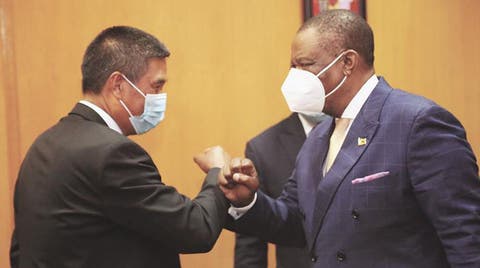Zimbabwe-India scale up economic relations
ZIMBABWE and India have resolved to accelerate economic relations, which have largely lagged behind the excellent political ties that exist between the two countries.
This emerged during an engagement between Vice-President Dr Constantino Chiwenga and Indian Vice-President, Jagdeep Dhankhar, on the sidelines of the 18th edition of the Confederation of Indian Industry (CII)-India-Africa Growth Partnership Conclave.
The conclave ran from last Wednesday to Friday under the theme, “Creating shared futures”.
In an interview at his residence in New Delhi yesterday, Zimbabwe’s Ambassador to India, Dr Godfrey Chipare said the two vice-presidents expressed satisfaction over the level of political relations between the two countries, but were disappointed by the low level economic interactions.
“As Ambassador (of Zimbabwe to India) I am happy with the success of the conference,” he said.
“The contact between the two vice-presidents signals an upscaling of bilateral relations between the two countries.
“In their meeting, it was noted that while political links were extremely good, the economic links were lagging behind and there is need to work on improving relations on the economic side.”
The same sentiments were expressed when Foreign Affairs and International Trade Deputy Minister, Dr David Musabayana, engaged his Indian counterpart.
The officials concurred that there was a need to upscale relations on the economic side.It is hoped that the anticipated official opening of the Zimbabwe Consulate in Mumbai, India, in the next few months, will boost economic relations between the two countries.
Mumbai is the capital of the Maharashtra State, south-western India, and is the country’s financial and commercial centre, with a population of about 21,3 million people.
In terms of the conclave, Ambassador Chipare said the high point was the Zimbabwe Country Session held last Thursday.
“That session was oversubscribed. It turned out that our time slot (of one hour) was inadequate because of the huge inquiries.
“The Honourable Vice-President (Dr Chiwenga) pitched for investment in Zimbabwe and we hope that as a result of this (the Zimbabwe Country Session), concrete follow-ups will be done by the Zimbabwe Investment and Development Agency (Zida),” said Ambassador Chipare.
Zida chief executive had a tough time engaging potential investors, who had been excited by the huge investment opportunities presented by VP Chiwenga.
The room was full to the rafters, as potential investors came to have a full appreciation of investment opportunities in Zimbabwe, especially following the massive reforms implemented by the Second Republic led by President Mnangagwa.
Zimbabwe has removed most of the grid locks, including the noble but contentious Indigenisation and Economic Empowerment Act.
Turning to the signing of the US$81,2 million agreement between the National Railways of Zimbabwe and RITES of India for the supply of 315 wagons and nine locomotives, Ambassador Chipare said the development was “a concrete step in improving the economy”.
“It will have downstream benefits in terms of our economic links between the two countries,” he said.
There is also a general feeling that as the two countries seek to escalate economic ties, the NRZ/RITES agreement could be the firm foundation for that.
The scope of the agreement involves the supply of 3 000 HP diesel-electric locomotives and high-sided open wagons by RITES.
The company is owned 100 percent by the Indian government, and is a leading transport consultancy and engineering firm involved in sectors such as highways, ropeways, airports, ports, institutional buildings, and renewable energy, among others.
RITES is the only export arm of Indian Railways to supply rolling stock, apart from Thailand, Malaysia, and Indonesia.
-chronicle











